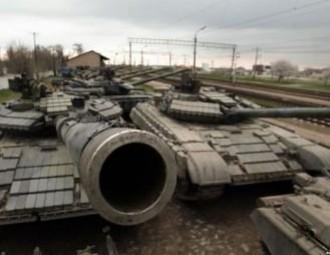Point of view: If Putin chooses to annex Belarus, there likely wouldn’t be much of an outcry

While the world is focused on Ukraine and government-Russian separatists’ standoff, it is neighboring Belarus that could be next on Putin’s agenda, write Douglas Cohn and Eleanor Clift.
Belarus, the landlocked former Soviet republic is just 350 miles by 400 miles, strategically located on Russia’s western border and Ukraine’s northern border.
The road from Poland and the West to Moscow is through the heart of Belarus. When Napoleon marched into Russia in 1812 and Hitler’s army attacked in 1941, that’s the route they took.
Most Americans have never heard of Belarus and those who have don’t have much sympathy for the government of Aliaksandr Lukashenka, a close ally of Putin’s who has run the country for almost 20 years, since the collapse of the Soviet empire. Belarus is the last dictatorship in Europe.
The large majority (72 percent) of the country is Russian speaking, and after a referendum in 1995, Belarus has two official languages, Belarusian and Russian. If Putin’s goal is to restore Russian greatness and re-assemble some of the territory that was lost, Belarus is a natural target.
Its population has such a strong affinity for Mother Russia that it’s an unlikely area to have separated in the first place. Still, after two decades, Belarusians prize their independence, prompting Lukashenka in an address to Parliament this week to warn of what’s at stake if indeed Russia with Putin at the helm has designs on their country.
“Any geopolitical issues, especially the ones in Eastern Europe, will definitely affect us,” he said. “In this situation we should stand by our most valuable thing – our country’s independence, a holy right to live on our land and choose our own destiny.”
If Putin chooses to annex Belarus, there likely wouldn’t be much of an outcry. Belarus is not a member of NATO, and its long association with Russia puts it in a special category, much like Crimea, as territory not worth fighting over. And its dependence on Russia for oil and gas limits its options, along with its independence.
Putin probably hasn’t made a move on Belarus because it is de facto Russian, so why bother, and it isn’t much of a prize economically. The Russian president has his hands full with a rocky transition in Crimea as pensioners and government workers complain they’re not getting their checks.
The Russian economy is tanking. More money left the country in the first quarter of 2014 than all of last year, as anybody with the wherewithal searches for an escape hatch. Putin looks tough and in charge, but Russia’s long-term outlook is pretty bleak if he can’t find a way to climb down from the crises he’s created. The escalating tension in Ukraine could explode into civil war at any moment.
Vice President Biden was in Ukraine over the weekend assuring the new president and the parliament that they have the support of the U.S. and the European Union, but that means modest financial assistance, not military intervention.
If the government’s attempts to oust Russian separatists from government buildings in Eastern Ukraine turn more violent, Putin would have his excuse to take those parts of the country by force. He would encounter little resistance unless he moves into any of the NATO member countries. That’s where he would be met with force, and rightly so.
NATO has increased its troop presence and over flights of the NATO-member Baltics since the crisis worsened, warning measures that should keep Putin at bay. But that’s not going to stop Putin from going farther into Ukraine. And, while all eyes are there, he could use the opportunity to reassert Russian dominance in Belarus.
Originally published at Washington Merry-Go-Round
-
03.01
-
07.10
-
22.09
-
17.08
-
12.08
-
30.09








































